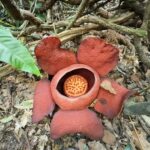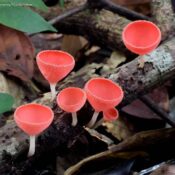Great hornbills mate for life
Great hornbills mate for life
The hornbill is the name of a family of large, Old World, tropical birds and often a bing cask on the head. Thirty of the world’s 54 species of hornbill occur in Asia with thirteen species found in Thailand. Khaosok has five confirmed species of hornbill including the rare helmeted hornbill.
Great hornbills mate for life and, like all hornbill cannot excavate these hole despite their impressive bill, but must rely on natural cavities where a limb tore out, or a bear excavated a beehive usually in large dipterocarp trees.When the breeding season arrives in January, the male will search out such a tree hole and take the female for approval. If accepted the female will enter the chamber and proceed to be locked in by plastering the entrance with mixture of mud, treebark, wooddust, food debris and even her own faces. A narrow vertical opening in the plaster, just big enough to be fed snakes, monitor lizards, civets or other predators to enter, is the desired result. From the time the nest is sealed until the chicks become fledglings (approx 60-90 days) the female and the brood are fully dependent on the male for all their food.
The male hornbill is an amazing provider. A great hornbill was once observed filling his crop with more than 200 figs at a time which were later regurgitated for the female and chicks back at the nest site. As the chicks grow they require more protein: insects, frogs, lizards, snacks and even other species of birds become food. The female dose not accept everything the male brings her, but selectively chooses what is best for her chicks. After months of voluntary confinement, the female finally pecks her way out of the increasingly cramped nest hole and both parents begin the task of teaching their young to forage for themselves. For millions of years hornbills have been a model for good parenting.
All Categories

United Kingdom
Quick booking process
092 365 1798


